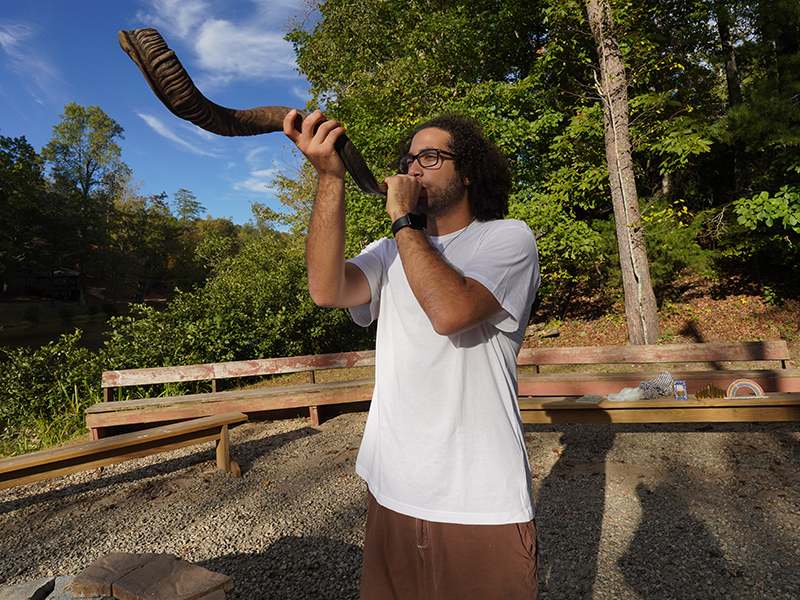 What could have possibly have been so bad about taking just one bite from a piece of fruit? But in Parashat B’reishit, the fruit Eve served to Adam was not just any fruit; it was fruit from the tree of knowledge of good and bad. Adam ate and did not ask any questions about where that delectable morsel came from. Consequently, that feast turned out to be Adam and Eve’s last supper, their last free meal, because they were expelled from the Garden of Eden immediately following dessert.
What could have possibly have been so bad about taking just one bite from a piece of fruit? But in Parashat B’reishit, the fruit Eve served to Adam was not just any fruit; it was fruit from the tree of knowledge of good and bad. Adam ate and did not ask any questions about where that delectable morsel came from. Consequently, that feast turned out to be Adam and Eve’s last supper, their last free meal, because they were expelled from the Garden of Eden immediately following dessert.
Not being just any plain garden variety of fruit, the fruit from the tree of knowledge of good and bad resulted in the loss of innocence in much the way a teenager leaves the innocence of childhood behind when acquiring adult interests in money, sex, and power. But was eating the forbidden fruit the sin that earned them God's scorn and a lifetime of sweat and toil, a punishment also passed onto succeeding generations?
Adam and Eve could not plead ignorance of the law; clearly, they had been warned, "You may eat all you like of every tree in the garden — but of the Tree of All Knowledge you may not eat, for the moment you eat of it you shall be doomed to die" (Genesis 2:16-17). Were they testing God's warning? Did boredom lead them to seek a cheap thrill by disobeying God or was it something else?
The beguiling snake mocked God by planting doubt in Eve's mind: "Did God really say, ‘You may not eat of any tree in the Garden?’…You most certainly will not die! ... (for) God knows that when you eat of it, your eyes will be opened and you will be like the gods, knowing all things” (Genesis 3:1, 4-5). Loss of innocence, failure to heed God's word, and mistrust of God's edict all should have been cause enough to have earned Adam and Eve a one-way ticket from Eden, but according to Rabbinic tradition, the sin that led to expulsion was different.
The paramount sin of the Garden of Eden was lack of accountability. When Adam was questioned by God about eating the fruit, he passed the responsibility to Eve: "The woman whom You gave me, she gave me the fruit of the tree, so I ate" (Genesis 3:12). Eve did not own up to her deed as well: "The serpent tricked me into eating it" (Genesis 3:13). Neither was willing to take responsibility for the misdeed, and so they were cast out of the Garden forever.
Jewish tradition is resolute in insisting that individuals take responsibility for their actions as the Mishnah instructs: "An individual is always responsible, whether the act is intentional or inadvertent, whether awake or asleep" (Mishnah, Bava Kama 2.6).
More than ever, this age, like so many others, is one in which people shrink from personal responsibility for action or inaction; all too many in the public and private sectors look for something or someone else to blame for their own objectionable behavior. Thus, the loss of personal accountability defines our age. This malaise fills our government and our courtrooms: "Don't blame me. I'm not responsible. I'm a victim." Some people successfully exploit loopholes in the law or launch false ad hominem attacks against others to deflect from their own misdeeds. The more this kind of behavior persists, the more it becomes accepted as “normal.”
Blame, elaborating grievances, and refining excuses are so much more convenient than is taking personal responsibility for one’s action. We’ve become a nation of whiners, always accusing someone else or some circumstance to explain away unsuitable behavior. Looking around makes one wonder if humankind has made any real progress since Eden. The fact that it hasn’t is the reason no one has ever been able to return to Eden, because only when people stand tall and take responsibility for their actions can there ever be a return to the tree of life at the center of the garden.
Rabbi Stephen S. Pearce, PhD is senior rabbi emeritus of Congregation Emanu-El of San Francisco, and a faculty member of the Fromm Institute for Lifelong Learning at the University of San Francisco and the Beyond The Walls: Spiritual Writing Program at Kenyon College. He is the author of Flash of Insight: Metaphor and Narrative in Therapy and other articles, poems, and books.
 Our Sages desperately wanted to read the Torah as one continuous narrative. Yet, even from the very beginning of our sacred text in Parashat B'reishit, this proved to be difficult. Genesis chapters 1 and 2 present a bit of a conundrum: how could man and woman be created twice? These Rabbis solved the problem by deciding that the man, Adam, was the same in both Creation stories, but that there was another wife before Eve. This woman they called Lilith1, and she stood in stark contrast to the subservient, submissive Eve. Lilith appears most vividly in a 10th century midrashic text, the Alphabet of Ben Sira:
Our Sages desperately wanted to read the Torah as one continuous narrative. Yet, even from the very beginning of our sacred text in Parashat B'reishit, this proved to be difficult. Genesis chapters 1 and 2 present a bit of a conundrum: how could man and woman be created twice? These Rabbis solved the problem by deciding that the man, Adam, was the same in both Creation stories, but that there was another wife before Eve. This woman they called Lilith1, and she stood in stark contrast to the subservient, submissive Eve. Lilith appears most vividly in a 10th century midrashic text, the Alphabet of Ben Sira:
When God created the first man Adam alone, God said, “It is not good for man to be alone.” [So] God created a woman for him, from the earth like him, and called her Lilith. They [Adam and Lilith] promptly began to argue with each other: She said, “I will not lie below,” and he said, “I will not lie below, but above, since you are fit for being below and I for being above.” She said to him, “The two of us are equal, since we are both from the earth.” And they would not listen to each other. Since Lilith saw [how it was], she uttered God's ineffable name and flew away into the air. Adam stood in prayer before his Maker and said, “Master of the Universe, the woman you gave me fled from me!” 2
Lilith dared to be equal, and the Rabbis of long ago frowned on her tenacity. Sadly, the message to Jewish women was clear: it is better to be created merely from Adam’s rib than from the same earth as man. Lilith was condemned to live as a demoness, terrorizing men in their sleep, and stealing babies from unsuspecting families. The superstitious tradition of wrapping a red string around a baby’s crib is meant to serve as protection from Lilith.3
As 21st century Reform Jews, we are lucky to live in a world that embraces equality, tolerance, and egalitarianism. Poets, scholars, writers, and musicians each contribute to the efforts to reclaim Lilith as a hero and an inspiration. May we all remember that each of us is made from the “same stuff” as everyone else, and may we all dare to be equal!
1. “Believed to be derived from the Akkadian, Lilitu, meaning ‘of the night,’ “ See BehindtheName.com
2. Alphabet of Ben Sira 78, Jewish Women’s Archive
3. Emma Green, “Yiddish Mystery Solved,” The Atlantic, October 31, 2015
Rabbi Marci N. Bellows is the spiritual leader at Congregation Beth Shalom Rodfe Zedek, Chester, CT.
B’reishit, Genesis 1:1−6:8
The Torah: A Modern Commentary, pp. 18–55; Revised Edition, pp. 17–50
The Torah: A Women’s Commentary, pp. 3–34
Haftarah, Isaiah 42:5–43:10 (11)
The Torah: A Modern Commentary, pp. 320−325; Revised Edition, pp. 51–55
Explore Jewish Life and Get Inspired
Subscribe for Emails

